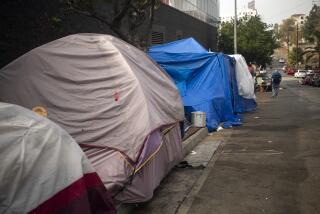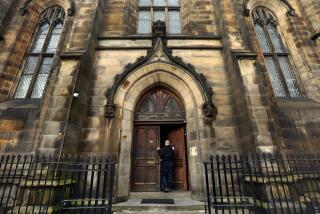RUSSIA : Moscow Homeless Ravaged by Cold, High Alcohol Use
- Share via
MOSCOW — A grim new barometer of freedom has come into existence in the Russian capital this winter--a daily count of homeless drunks found dead from the cold.
At least 320 Muscovites have frozen to death on the capital’s mean streets since November and another 800 have been hospitalized for exposure, said Igor F. Nadezhdin, spokesman for the Moscow Department of Health Care.
The soaring tolls are blamed on a particularly harsh winter coinciding with the first cold season in which it is no longer a crime to be a drunk or a vagrant.
But in a country where social services have been knocked out of existence by economic crisis, there is now virtually no public assistance for the city’s estimated 300,000 homeless. Their newfound freedom from arrest and detention, police and health officials complain, is increasingly translating into a ticket to an early grave.
In a country where as much as 60% of the male population is estimated to be alcoholic and vodka is often cheaper than food, the rate of drunkenness among the homeless is shocking. Police estimate it is more than 90%. And it is from this down-and-out stratum that several citizens each night stagger into icy courtyards or pass out in dark alleys to be found frozen and lifeless in the morning.
“This is a consequence of the broadening of human rights in this country, that people now must decide for themselves when they need treatment,” said Viktor N. Karasev, head of the public order division of the Moscow Police Department. “But people who are already totally degraded cannot decide that they need to recover. They should be sent by the authorities to treatment centers.”
Under the repressive protectiveness of the Communist system, it was against the law to be a BOMZH--the Russian acronym for “without specific place of residence.” Those repeatedly found drunk in public and deemed to be social parasites were dispatched to one of Moscow’s five “medical-labor rehabilitation centers,” where they worked for as long as two years to pay for their detoxification and treatment. Federal decrees in 1993 ordered an end to the practice of forcing alcoholics into what were actually labor camps; the last of the centers closed last year.
The problems of homelessness and vagrancy have only worsened, however. Russia’s economic transition has created more unemployment, and a lucrative property market has pushed many of the poor out of their homes.
City officials announced this month that they are planning to open 10 new shelters for the homeless this year. A city of about 9 million residents and 3 million daily visitors, Moscow now has only one 24-bed facility. Even if the shelters are built, they are likely to remain woefully insufficient for the growing hordes of vagrants.
“We cannot have a program of keeping the homeless, beggars and tramps off the streets. That is now against the law,” said Natalia N. Tyrkina, a spokeswoman for the city Social Security Committee. “The notorious Article 209 [banning vagrancy] has not been revived, as far as I know.”
The sudden rise in deaths among the Moscow homeless is attributed by police to the closure of the mandatory treatment centers and the lack of a viable alternative to take care of the capital’s army of drunks.
Twenty vytrezviteli, or sobering-up stations, take in an average of 1,500 homeless people picked up each night by police for public disturbances. Most are released in the morning, as the city has space for only about 160 administrative detentions of homeless people.
Police are pressing city authorities to expand the detention space and revise laws guaranteeing the release of drunks who have committed nothing worse than misdemeanors.
“We need to render help to these people. They are in bad shape,” said Vitaly N. Gunenkov, a spokesman for the city police force.
Otherwise, he warned, they will continue the chronic drinking that contributes to the capital’s vicious circle of destitution breeding violence and crime.
More to Read
Sign up for Essential California
The most important California stories and recommendations in your inbox every morning.
You may occasionally receive promotional content from the Los Angeles Times.














